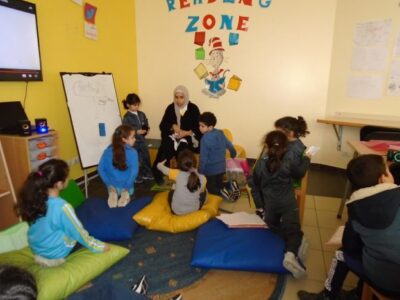Al-Hayat International School (HIS) is an International learning community which aims to embrace students from various cultural and social backgrounds. We focus on developing students’ understanding and knowledge. Therefore, we view language in HIS as both a goal and a process. We believe that:
- Language is fundamental to the success of all students learning
- Every student has a set of individual and cultural experiences, as well as skills and interests which must be considered in the teaching and learning process
- The development of the mother-tongue language and acquiring more than one language (Baker, 2000) is crucial for cognitive development and in promoting cultural identity. It also has the potential to increase intercultural awareness and understanding, and enables students to remain in touch with, and maintain esteem for, the language, literature and culture of their home country. It is a strong predictor of their long-term academic achievement, including acquisition of other languages
- The learning of any language is developmental by nature, building constructively on individual knowledge that helps in student progression
Language is an essential tool in making learning relevant and meaningful in every context. These contexts vary, but often involve the use of real-life situations, native speakers, the local area and a wide variety of text types. Learning of a language happens through inquiry, allowing students to make contextual connections, explorations, and investigations. As such, all teachers are language teachers as language transcends curriculum areas. Through the IB language programmes, we aim to develop confident, curious, proficient and enthusiastic readers, writers, viewers, presenters, critics, speakers and listeners. Learning and teaching language in HIS involves:
- Learning language as a means of communication
- Learning about language to develop a deeper understanding of linguistics
- Learning through language as a means of self-expression, thinking, and reflection
As an international school situated in Lebanon, we are strongly committed to a bilingual program where both the Standard Arabic and English languages are the languages of instruction. We rely heavily on utilizing the host country and community for language and cultural experiences throughout the curriculum. The acquisition of additional languages allows students to further reflect upon and explore different cultural perspectives.
Inspired by the IB standards and practices (2014), HIS developed its language policy entailing the following: analysis of the school language profile, language practices in the school, admission and language policy, and the language policy reviewing process.
Briefly, HIS main linguistic goals are as follows:
- During the first years, the focus is on listening to the child. During this period, the students are allowed to express their ideas and feelings using their own written and oral language. The children are not introduced to or forced to follow any language rules that might limit the way they think or might suppress their creative communication with the world
- In the lower elementary classes, students discover basic linguistic rules. Further language skills and rules are formally introduced and acquired holistically through language use across disciplines
- In the upper elementary classes, students learn linguistic, semantic, and syntactic norms necessary for general oral and written communication
- In middle years and secondary classes, students are equipped with linguistic, semantic, pragmatic, and syntactic skills necessary for oral and written production and understanding of academic language use. Language proficiency is developed within six domains—listening, speaking, reading, writing, viewing, critiquing, and presenting. Students are encouraged to use language as a vehicle for thought, creativity, reflection, learning, self-expression, analysis and social interactions.
Co-teaching is the methodology used at HIS. A minimum of one Arabic homeroom teacher and one English homeroom teacher co-teach simultaneously. Students are able to inquire into trans-disciplinary and interdisciplinary concepts. Separate language sessions are allocated to boost language practice and help develop linguistic skills.
